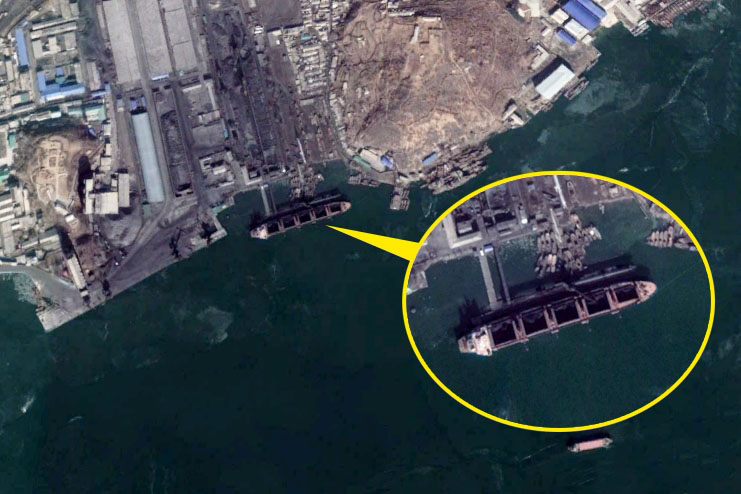As part of North Korea’s coal smuggling operations abroad to earn foreign currency, North Korean-flagged vessels have been unloading coal at a port in China in defiance of international sanctions, Daily NK has learned.
“North Korean coal stored at Nampo Port [in South Pyongan Province] has been secretly coming into Huludao Port in China’s Liaoning Province,“ a China-based source told Daily NK on Monday.
The cargo is usually transported and unloaded at night to avoid satellite-based surveillance conducted by the international community, Daily NK sources explained.
Daily NK was unable to confirm whether the final destination of the coal was Huludao Port, another area in southern China, or an entirely different country.
Ordinarily, North Korea’s coal exports are managed directly by the Workers’ Party of Korea (WPK), but recent illegal exports to China were ordered by the country’s Ministry of Coal Industry, Daily NK sources said.
“Coal is an important resource typically transported by order of party [WPK]. This time the Ministry of Coal Industry [an organization part of the country’s government apparatus] that gave the order,” said the China-based source. “That’s because the party likely told the Ministry of Coal Industry to manage coal [exports] by themselves.”
North Korean party officials may have delegated the illegal export of coal to the Ministry of Coal Industry so that they would be able to obtain foreign currency without being directly accused of violating international sanctions. Faced with signs that North Korea’s coal industry may collapse due to sanctions on coal exports, party officials may have actually encouraged the smuggling of the coal by ordering the ministry to quickly sell it off.
Since the beginning of last month, cargo trucks have been regularly spotted departing from coal mines in Sunchon, Chaedong, Tokchon, Kaechon, Pukchang and other areas of South Pyongan Province and heading in the direction of Nampo Port.
“Since September, coal that was transported from various regions have been piling up at the port,” a Pyongyang-based source told Daily NK. “The coal will likely be transported overseas.”
United Nations Security Council Resolution 2371 bans North Korea from exporting coal. North Korea has previously been caught smuggling coal by transferring coal shipments to other ships (transshipment) in international waters, or by turning off the AIS (automatic identification system) on its vessels.
A midterm report released on Aug. 30 by the UN Security Council Sanctions Committee on North Korea Panel of Experts included suspected cases of North Korean coal flowing into other countries. The panel also reported that North Korea had been discovered exporting coal amounting to 930,000 metric tons over 127 trips between January and April.
The resurfacing of accusations against North Korea smuggling coal into China is expected to intensify criticism of both North Korea and China for their violations of international sanctions.
North Korea’s illegal coal exports have also led to a spike in the price of coal in the country. Daily NK sources have reported that coal prices rose from August after rumors began circulating that North Korea would begin to export coal in large quantities. In Pyongyang, the price of coal rose from KPW 60,000 per ton in early August to KPW 70,000 per ton by mid-August. By the beginning of October, the price of coal had reportedly risen to KPW 130,000 per ton.
“By the start of October the going price of coal from the mines was KPW 120,000 per ton. In Pyongyang, it had risen to KPW 180,000 per ton,” another Pyongyang-based source told Daily NK.
In sum, the price of coal appears to have more than tripled between early August and mid-October.
“North Korean coal is going for KPW 120,000 to 130,000, but North Korean coal traders will likely be asking Chinese coal buyers for about 1.5 to three times the price of freshly-made coal to cover transportation costs to Nampo Port and other expenses,” the source added. “North Korea will be able to earn a significant amount of foreign currency through illegal coal exports.”
Daily NK has previously reported on North Korea’s export of coal into China despite Chinese authorities own tightening of regulations on its import, and cited North Korea-based sources to report in May about a spike in coal prices in South Hamgyong Province.
*Translated by Violet Kim
Please direct any comments or questions about this article to dailynkenglish@gmail.com.


















